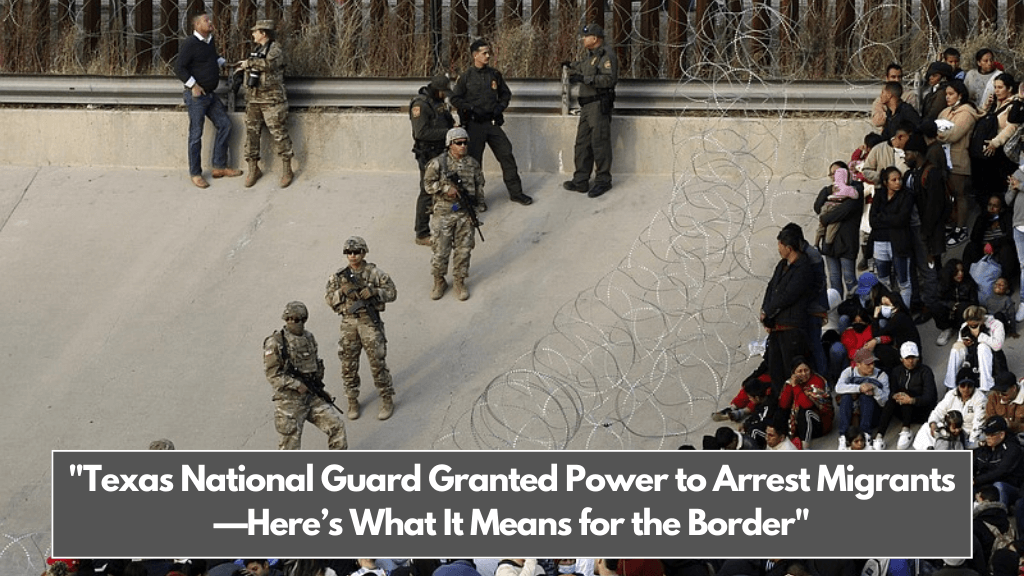The role of the Texas National Guard in immigration enforcement has been expanded under a new agreement with the Trump administration. Guard members are now authorized to arrest, investigate, and detain migrants who enter the U.S. illegally from Mexico.
This move marks a significant shift in how military forces can operate along the southern border, as previous restrictions limited their involvement to supporting roles like surveillance and barrier construction.
What Powers Does the New Agreement Give the Guard?
Under the pact signed on Friday between Texas and U.S. Customs and Border Protection (CBP), Texas National Guard members are granted the authority to:
- Investigate, arrest, and detain migrants for deportation purposes.
- Act under the supervision of CBP officials and maintain communication with them via radio or phone.
This agreement builds on Republican Governor Greg Abbott’s 2021 order, which allowed the Guard to arrest migrants for trespassing on private property along the border. The new deal, however, expands their authority to public areas and broader border enforcement operations.
Why Is This a Significant Shift?
The agreement represents a change in the traditional role of the military, which is generally prohibited from engaging in civilian law enforcement under the Posse Comitatus Act of 1878. Previously, military involvement at the border focused on support activities, such as:
- Monitoring and surveillance.
- Constructing physical barriers.
- Gathering intelligence.
However, Trump’s legal advisers argue that exceptions can be made, particularly for issues like combating drug trafficking and managing mass migration. This shift allows for a more hands-on role by military forces in detaining migrants.
Governor Abbott’s Take on the Agreement
Governor Greg Abbott has described the expanded role of the National Guard as a way to “boost manpower for border security.” He has long been critical of federal immigration enforcement under President Joe Biden and has defended Texas’ border operations, including:
- Operation Lone Star: A state-led initiative that has seen thousands of migrants bused to Democratic-controlled cities as a political statement.
- Physical Barriers: Texas has placed barriers, including a controversial line of buoys in the Rio Grande, to deter border crossings.
Abbott argues that Texas’ increased border operations serve as a necessary “stopgap” in response to what he sees as inadequate federal enforcement.
Criticism and Concerns
The expanded role of the Texas National Guard has drawn criticism from Democratic lawmakers and immigrant rights advocates.
Key Concerns Include:
- Escalating Tensions: Democratic state Rep. Gene Wu warned that giving the Guard arrest authority could make law enforcement encounters more dangerous and generate fear among migrants.
- Potential for Misuse: Critics argue that involving military personnel in law enforcement without adequate training could lead to legal challenges or abuses of power.
Matthew Hudak, a retired deputy chief of the Border Patrol, downplayed concerns, stating that the agreement doesn’t give the Guard blanket authority to stop people but rather signals cooperation between federal and state agencies.
How Is the Military Already Involved at the Border?
The Trump administration has taken several unprecedented steps to involve the military in immigration enforcement, including:
- Military Deportation Flights: Trump’s administration initiated deportation flights operated by the military, which had not been done by previous presidents.
- Detention Center at Guantánamo Bay: Trump has proposed using the facility to hold large numbers of criminal migrants.
- Deployment of Troops: In his first week back in office, Trump deployed 1,600 active-duty troops to the U.S.-Mexico border, with plans to send more.
On Monday, the Defense Department confirmed that additional military personnel had been stationed at Guantánamo Bay to support ongoing immigration-related operations.
Operation Lone Star: A Broader Strategy
The agreement with the Trump administration builds on Texas’ ongoing Operation Lone Star, which includes:
- Busing Migrants: Texas has transported thousands of migrants to major cities like New York and Chicago to shift the burden of care to Democratic-controlled regions.
- Barrier Installation: Giant buoys and razor wire fences have been placed along the border to prevent crossings.
- State Law Enforcement: Texas has deployed state police alongside the Guard to arrest migrants on various charges, including trespassing.
Abbott has repeatedly clashed with the Biden administration over Texas’ border measures, arguing that they are necessary to fill gaps in federal enforcement.
The expanded role of the Texas National Guard signals a shift in how border security is handled, blurring the lines between military and law enforcement duties. While supporters see it as a necessary step to address rising migration, critics warn of potential legal and humanitarian risks.
As Texas and the Trump administration continue to collaborate, the long-term implications of this agreement—both legally and on U.S.-Mexico relations—remain to be seen.
